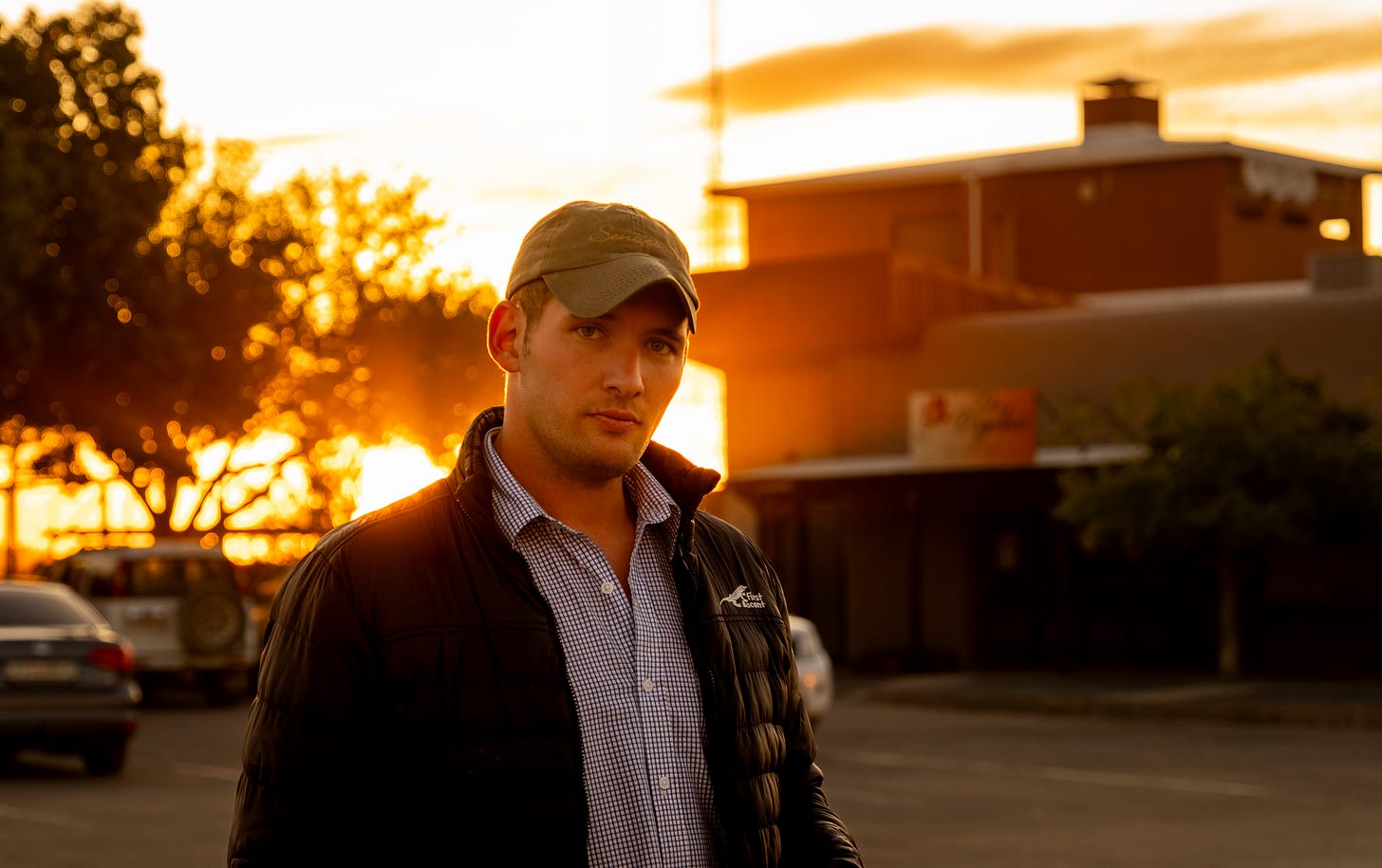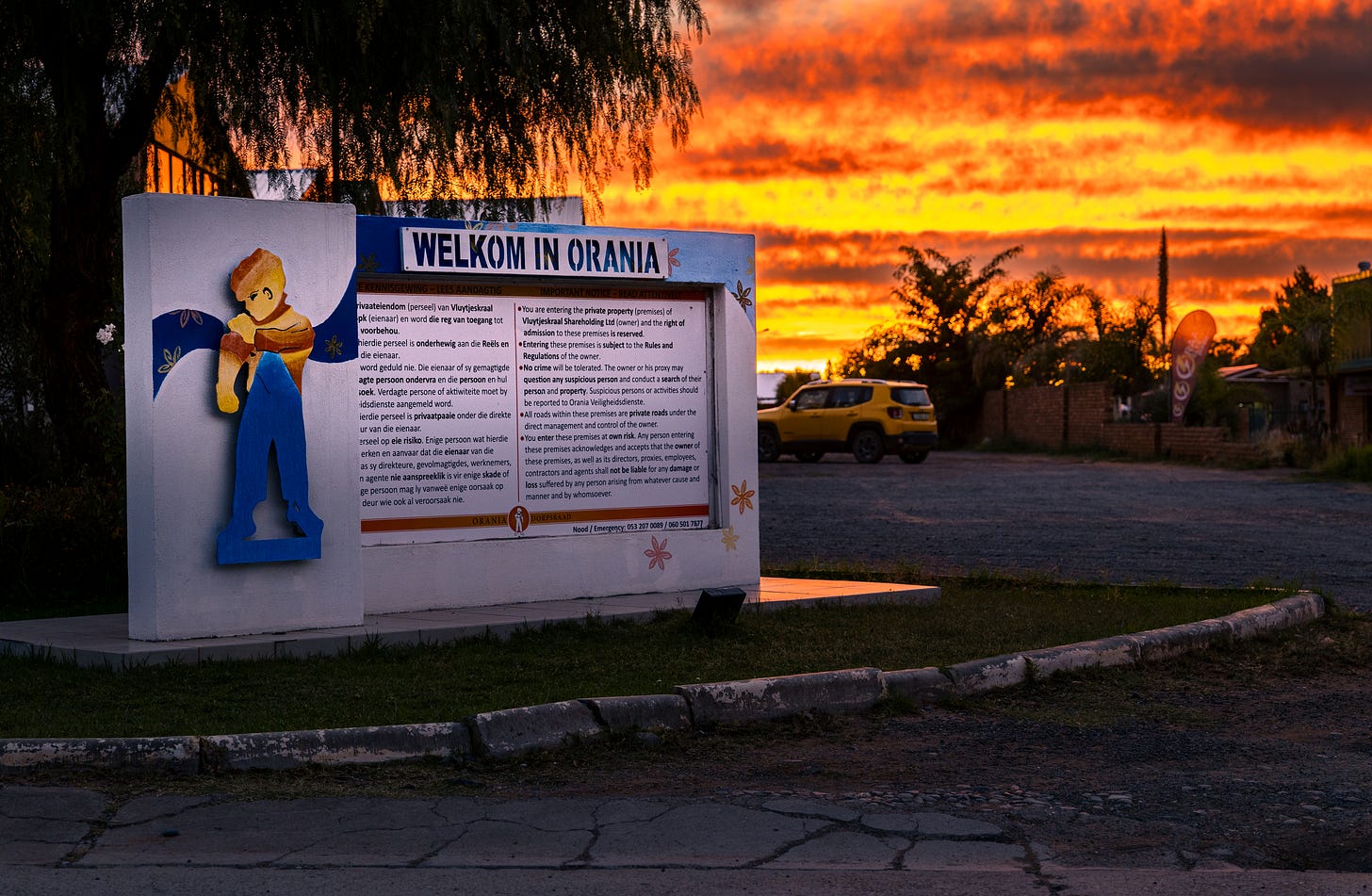Orania: A Beacon of Cultural Autonomy in South Africa
A Peek into My Ongoing Book Project about this Unique Oasis in South Africa's Semi-Desert and Its Pursuit of Independence and Cultural Survival.
I am currently deeply immersed in my next project - a photo book about Orania - which will be a visual journey complemented with analyses. We will follow this small town's journey, from being a barren wasteland situated in a semi-desert, to the oasis Orania is today. We will explore the journey that a handful of families started 30 years ago when they decided to settle here as pioneers, to now being a municipality with a strive to become an independent nation.
I've just completed a first draft of the introductory chapter, which is about Orania's symbol "Die Klein Reus" – "The Little Giant". The chapter is tentatively titled "Rolling Up the Sleeves". I'm very pleased to share this draft with you, my subscribers, allowing it to see the light of day in a beta version before it's finally sent to print.
If you want to support this book project, you can assist me by subscribing to this newsletter. I appreciate all the support I can get for this ambitious and exciting project.
ROLLING UP THE SLEEVES

Orania's symbol, "Die Klein Reus" – "The Little Giant" – powerfully embodies the Afrikaner people's will and determination to build and maintain their own future. This image of a young boy rolling up his sleeves to work is deeply representative of Orania as a city and for its inhabitants. They prioritize self-sufficiency and community, refuse foreign labor, and tackle all tasks themselves. In Orania, there's no job that the residents consider themselves too fine to perform.
In contrast, the broader Afrikaner culture in South Africa has historically relied on black labor. Traditionally, certain tasks were considered incompatible with white identity. Jobs associated with black labor have created a mental and cultural barrier for whites, preventing them from performing these chores. An example of this is unskilled, physically demanding jobs, or to put it more bluntly - the blacks perform the dirty work under a white supervisor's leadership.
To challenge these ingrained norms, Orania's inhabitants have taken on all sorts of work, regardless of society's expectations or cultural perceptions. However, this work philosophy has not always been well received. Many in the broader Afrikaner community in South Africa struggle to understand this, which has created a distinct difference in how things are handled in Orania compared to larger parts of the rest of the Afrikaner society in South Africa.
For example, it's not uncommon for a typical white middle-class family to have both a black domestic helper managing the household and a black gardener taking care of the garden. In other words, there are adults who have never had to make their own bed; it's a 'luxury' they can afford and has left its cultural imprint.
However, the conditions in Orania are different. Here, one simply makes one's own bed and hires one's own labor if, for instance, one needs help with the garden. Naturally, it will cost more to hire a white person to mow the lawn than it would to hire a black person.

The cheaper alternative would be to hire black labor, but this comes with other costs – such as sacrificing one's own independence. Joost Strydom, chairman of the Orania Movement, phrases it as "demographics is destiny". He believes it's absolutely necessary for Orania to do its own work for the white Afrikaner minority to survive. These principles are more than just symbolic. By taking responsibility for all tasks, no matter how dirty or uncomfortable they may be, the residents of Orania not only achieve a strong sense of community, but they also take steps towards real independence.
If black labor is brought in and the demographics shift, they will also demand political influence in proportion to their numerical strength. Ultimately, this would mean the cessation of self-determination.
This development can now be seen throughout the Western world with the extensive immigration. It's interesting to draw parallels between the situation in Orania and Western societies, such as Sweden. An argument that was often made at the start of mass immigration was that immigrants would do the jobs that the majority population didn't want. The result, however, has been that the majority population is gradually becoming a minority. In Sweden, we can already see that Swedes make up a minority in several major cities, such as Malmö, and that according to current demographic trends, Swedes could become a minority at the national level in the very near future.
Demographic changes are indeed something to take into account.
When we study the demographic history of South Africa, it's striking how quickly the black population has grown in comparison to the white population. Since the founding of South Africa, the black population has increased to such an extent that it became unsustainable to keep the growing black majority outside the power structure, leading to the current government.
Whites have never constituted a majority in South Africa, at least not within the country's current borders. However, the percentage of whites in the population has significantly decreased over the past century. In fact, the white population, which according to historical estimates may have constituted about 25 percent of the total population at the beginning of the 20th century, has now decreased to about 8 percent.
To ensure that one's own group is in control of its own fate, and not left at the mercy of others, is also to ensure one's own demographic - hence the phrase "demographics are destiny".
It is a major challenge for South Africa's white minority to deal with the loss of the country they once built and controlled. The frustration and striving to regain control of their own destiny permeates many aspects of the white society. There is a strong desire for international recognition of the fight for self-rule, or at least for basic protection of their rights. This, against the backdrop of legislation such as Black Economic Empowerment (BEE), which in practice excludes large parts of the white population from the job market.
Transitioning from frustration and striving for revival to accepting the prevailing situation and starting to work under the existing conditions, rather than the ones desired, is a difficult but necessary shift. This adaptation - a symbolic fresh start - is reflected in the image of the young boy rolling up his sleeves.
It is a gesture of determination and courage, a will to start over and take control of their own future, despite the challenges the white society faces. And it is this spirit of independence and self-reliance that is at the heart of Orania.
All of these challenges and progress in Orania reflect a broader global theme of cultural autonomy and survival in an increasingly globalized world. While massive immigration changes the population dynamics in cities and countries around the world, Orania represents a resistance front against this trend.
It's not just a place for white Afrikaners to survive and grow, but also an experiment in what kind of society can emerge when a group of people decide to take control of their fate. No matter how you look at it, Orania stands as a powerful reminder of the deep human need for self-determination and community.
And this is exactly what constitutes the core of Orania's symbol, "Die Klein Reus". The symbol depicts a young boy rolling up his sleeves, ready to work, ready to build a future for himself and his people. He is an image of the will and determination required to navigate the challenges and changes we face.
I'm convinced that we all have something to learn from this little giant. In Sweden, we have a popular expression, 'gilla läget', or 'like the situation', which is used in situations where one must accept the circumstances as they are, regardless of whether they are ideal or not, and continue moving forward. It's about accepting and making the most of the situation one finds oneself in.
This is what I see when I look at this little giant - it may not be pleasant to leave behind what one has already built, perhaps over generations, whether it's in Pretoria, Johannesburg or one of the beautiful coastal cities. However, the key is to see the situation for what it is, to 'like the situation', and do what is necessary.
Perhaps the answer is to start over in the wilderness, to build something from scratch. The closest English expression I can think of that corresponds to what I'm referring to might be "rolling with the punches". And quite fittingly, when you're rolling with the punches, it seems you also roll up your sleeves to be able to throw one yourself!






